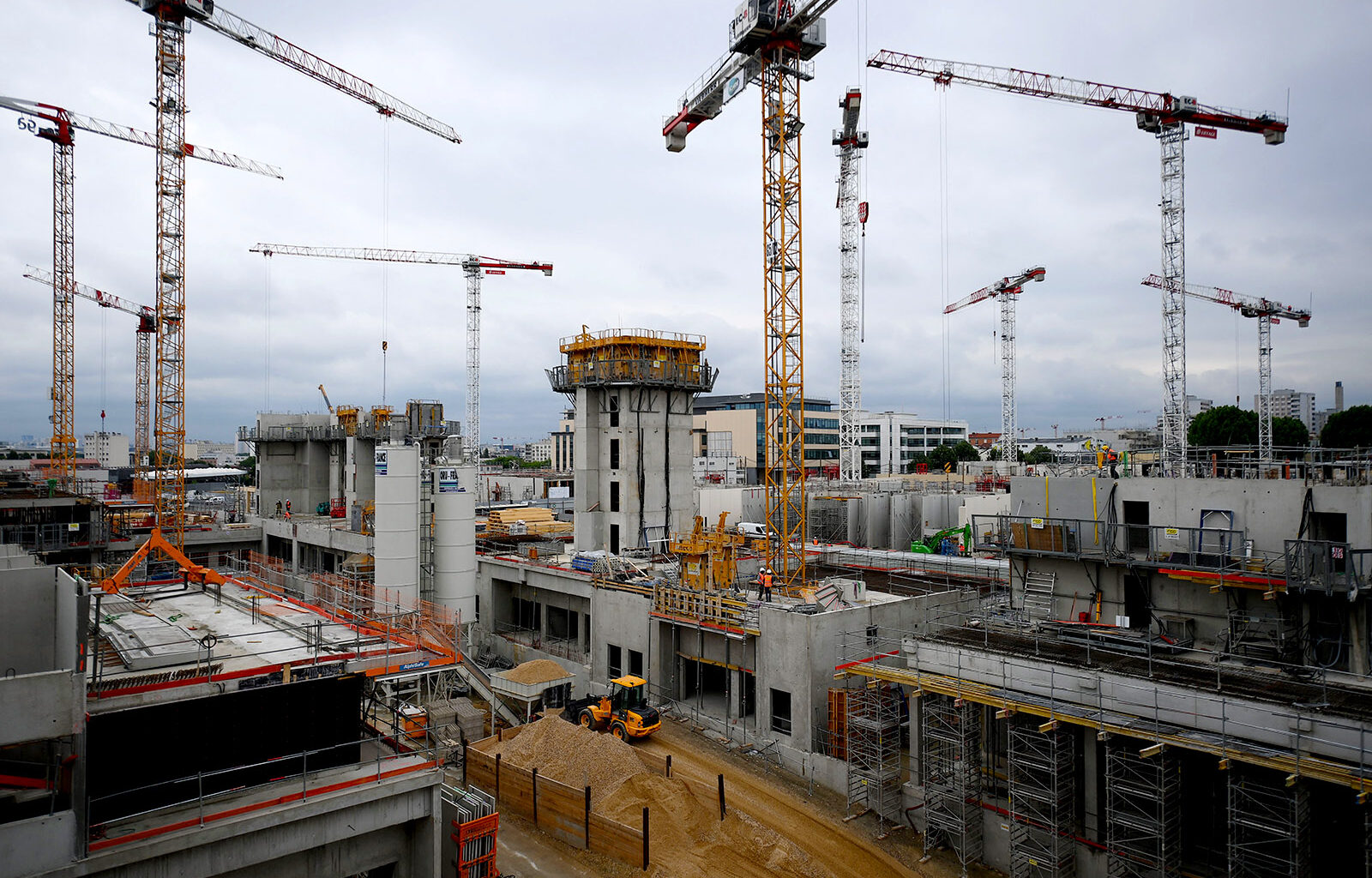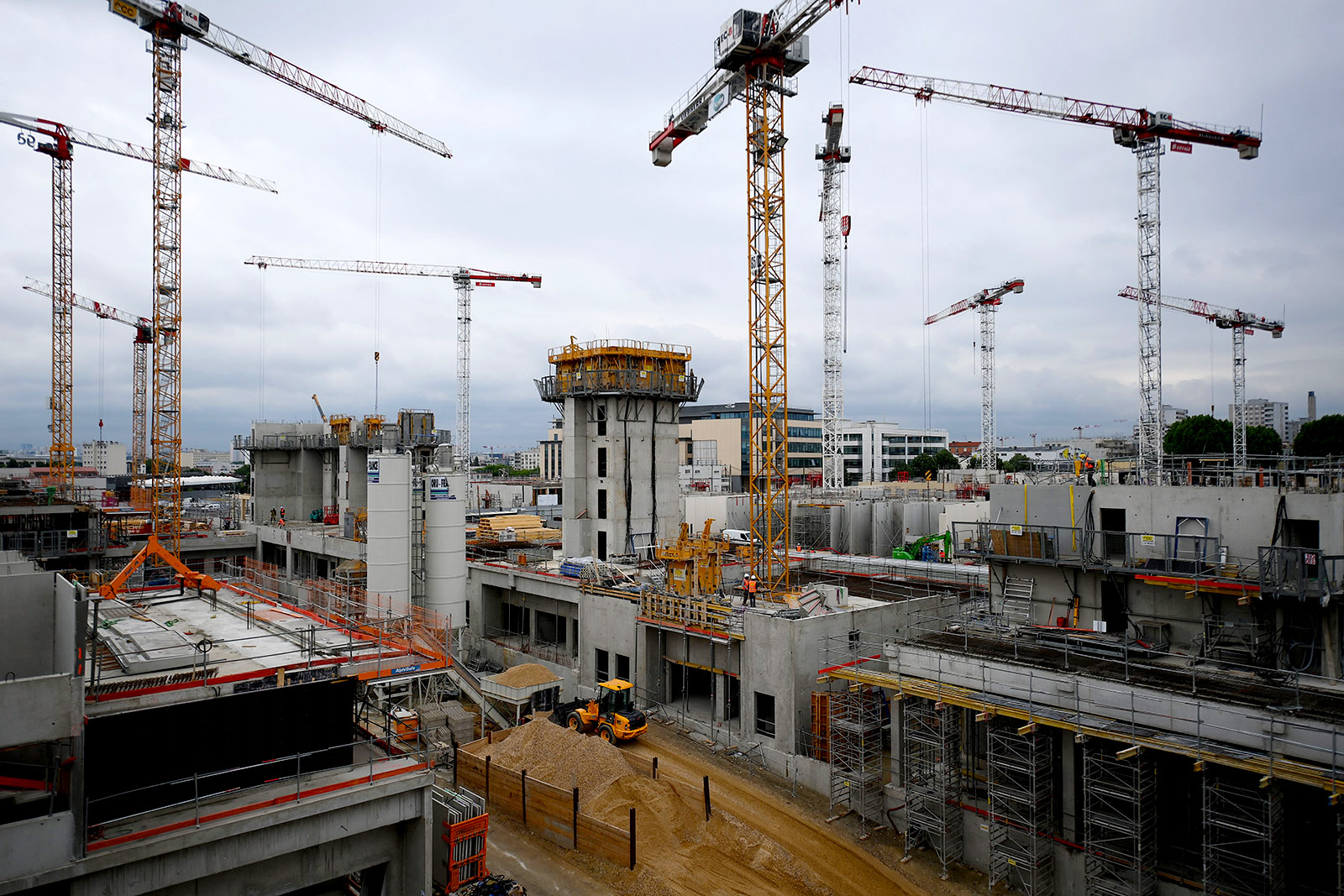 The Olympic village under construction in Saint-Denis in 2022. Photograph by Franck Fife/Getty Images
The Olympic village under construction in Saint-Denis in 2022. Photograph by Franck Fife/Getty Images
Paris pitched the Games as a solution to a long-term housing crisis in Saint-Denis, one of its poorest neighbourhoods. One year later, residents have little hope of these promises ever being kept

Freelance reporter
24 July 2025
Last summer, the Parisian suburb of Saint-Denis briefly became the centre of the world. It was here, in one of France’s poorest communes, that thousands of athletes from more than 200 countries were based in the Olympic village for the 2024 Games. The mood was jubilant. As the torch relay passed through its boulevards, led by past medal winners and celebrities including Snoop Dogg, it drew cheering crowds.
Almost a year on, just streets away from the relay route, a small group of local residents are protesting outside the local government offices. Behind a yellow banner reading Droit Au Logement (Right to Housing), they chant: “What do we want? Housing! For whom? For everyone! For when? Now!”
Paris pitched the Games as more than a sporting spectacle, promising they would drive development, including new housing, in Saint-Denis. President Emmanuel Macron claimed the project would be “a model, a laboratory for what we want to do” to tackle France’s housing crisis. Local authorities now face growing scrutiny over those promises.
“I haven’t spoken to anyone who expected the Olympics would improve the housing situation,” says Marie Huiban, one of the protest organisers. “On the contrary, it made it worse.”
Huiban, who lives in Saint-Denis, has been an activist with the campaign group Right to Housing, which organises against evictions, for more than fifteen years. The demonstration, the second of two in June, called for the local authority to respect its legal social housing obligations.
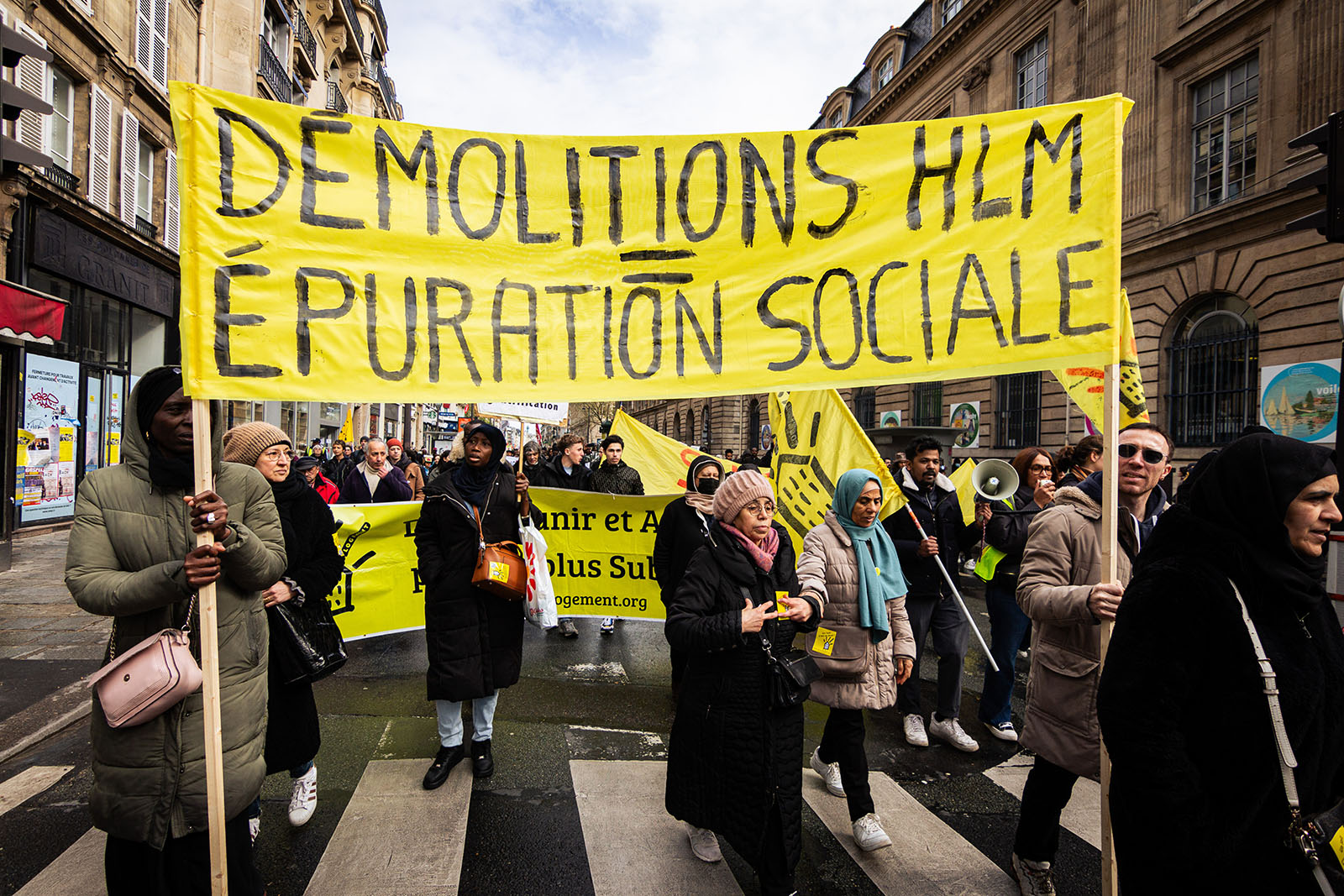 Protesters at a 2024 demonstration against the housing crisis in Paris. Photograph by Telmo Pinto/Getty Images
Protesters at a 2024 demonstration against the housing crisis in Paris. Photograph by Telmo Pinto/Getty Images
In France, authorities must rehouse people in urgent need of social housing within six months. But in Saint-Denis, Huiban claims this target is routinely missed. She also cites frustration over the limited number of new social homes in the athletes’ village and the demolition of existing residential blocks.
The tale is a familiar one. In Los Angeles, in Rio, in Athens and in London, city officials pledged that hosting the Olympics would bring lasting benefits to poorer residents, but all have faced questions over whether they delivered lasting change. The 2012 London Olympic Games is a case in point. Having promised a third of the 30,000-40,000 new homes built as part of the games would be affordable, the city finally delivered around 11% while thousands of social housing units were demolished for the event.
Amid growing criticism over the societal, economic and ecological impact of the Olympics, Paris promised this time would be different. The city’s original pitch, made jointly with the department of Seine-Saint-Denis, promised those living around the proposed Olympic and Paralympic village in Saint-Denis that they would “see new investment, jobs and housing”.
Saint-Denis has long had a fractured relationship with the capital. Historically, the suburb served as a key industrial hub to Paris. After the second world war, when France urgently needed workers for reconstruction, many north Africans, some still considered colonial subjects, answered the call.
Yet the state provided them with almost nothing. Many were forced to live in makeshift shantytowns on the city’s outskirts, lacking basic services like running water, known as bidonvilles. From the 1950s onwards the dire housing conditions gradually began to improve, with the construction of large housing blocks. However, for decades, the predominantly Muslim community of Saint-Denis has remained socially, economically, and physically isolated – by an eight-lane motorway – from Paris proper.
Such is the scale of housing demand in Seine-Saint-Denis that the emergency hotline for people facing immediate homelessness is overwhelmed. More than 9,000 people who called the hotline last year were not offered accommodation, according to a coalition of housing charities.
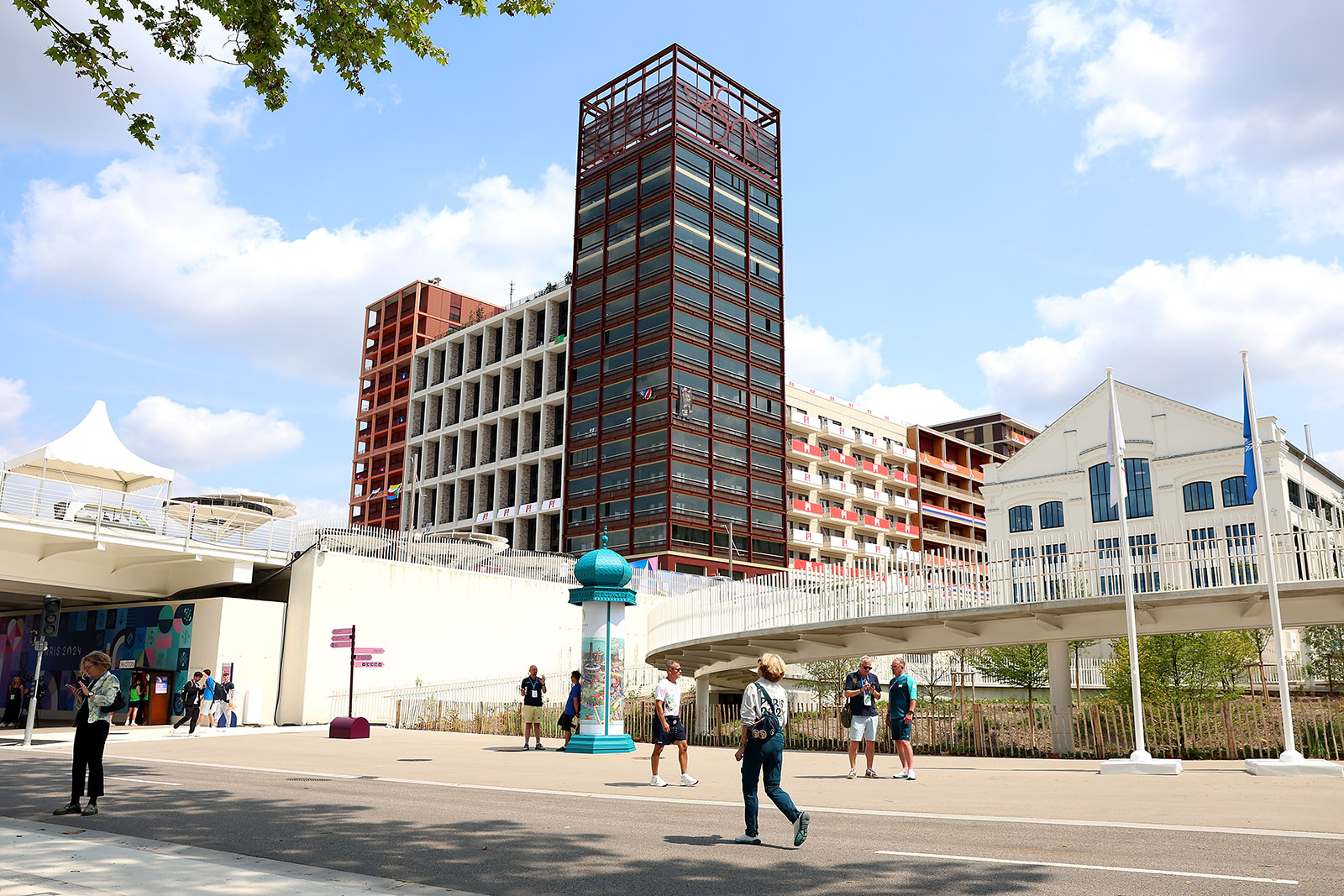 The Olympic village shortly before the start of the Paris Games in July 2024. Photograph by Richard Pelham/Getty Images
The Olympic village shortly before the start of the Paris Games in July 2024. Photograph by Richard Pelham/Getty Images
The department is also shouldering a high number of social housing requests. At the end of 2024, there were 142,971 households on the social housing waiting list that had chosen Seine-Saint-Denis as their preferred location – up 20% from 2019, according to statistics published by the Paris region’s housing department. Of those, 13,562 are in urgent need, indicating they could be already homeless, threatened with eviction, or in overcrowded housing. But the department was only able to find social homes for 9,811 households that year.
Although Paris has a significantly higher number of households on its social housing waiting list (195,828 in 2024) its population is almost double that of Seine-Saint-Denis, meaning it has far fewer demands per head. In addition, more than a quarter (28.4%) of households in Seine-Saint-Denis live below the poverty line – the highest in metropolitan France – compared to 15.6% in Paris, according to official stats. A tenth of the working-age population in Seine-Saint-Denis was unemployed in 2024, compared to just under 6% in Paris.
The Olympics was framed as part of an ongoing programme to try address those inequalities, but local associations have been critical of its social impact. Le Revers de la Médaille (The Other Side of the Medal), a collective of associations supporting people who are homeless or living in precarious housing, awarded the city of Paris a symbolic “gold medal in social washing” in a report released in November 2024. The group documented a sharp increase in street clearances, squat evictions, and relocations in the lead-up to the Games, particularly across Seine-Saint-Denis.
Paul Alauzy, a field worker with Médecins du Monde and member of the collective, described the Games as a disaster for people on the streets. “We saw what we call a kind of Olympic lockdown,” he said. “People just stopped moving. They were afraid: afraid of police, of being fined, of being deported. So they stayed hidden, and many went hungry.”
On one outreach visit, Alauzy recalls meeting a man pushed out of Paris, now living by the périphérique, the capital’s outer ring road, and watching Sudan’s basketball team on his phone.
“He said, ‘I’m a street vendor. Paris is full of police, so I can’t work anymore, I only move to go to food distribution points. I eat less than usual because I have no money. So I’m hungry.’ But at the same time, he was watching the Olympics and telling me, ‘Yeah, actually, my country is the best in Africa. And I’m really proud to watch.’”
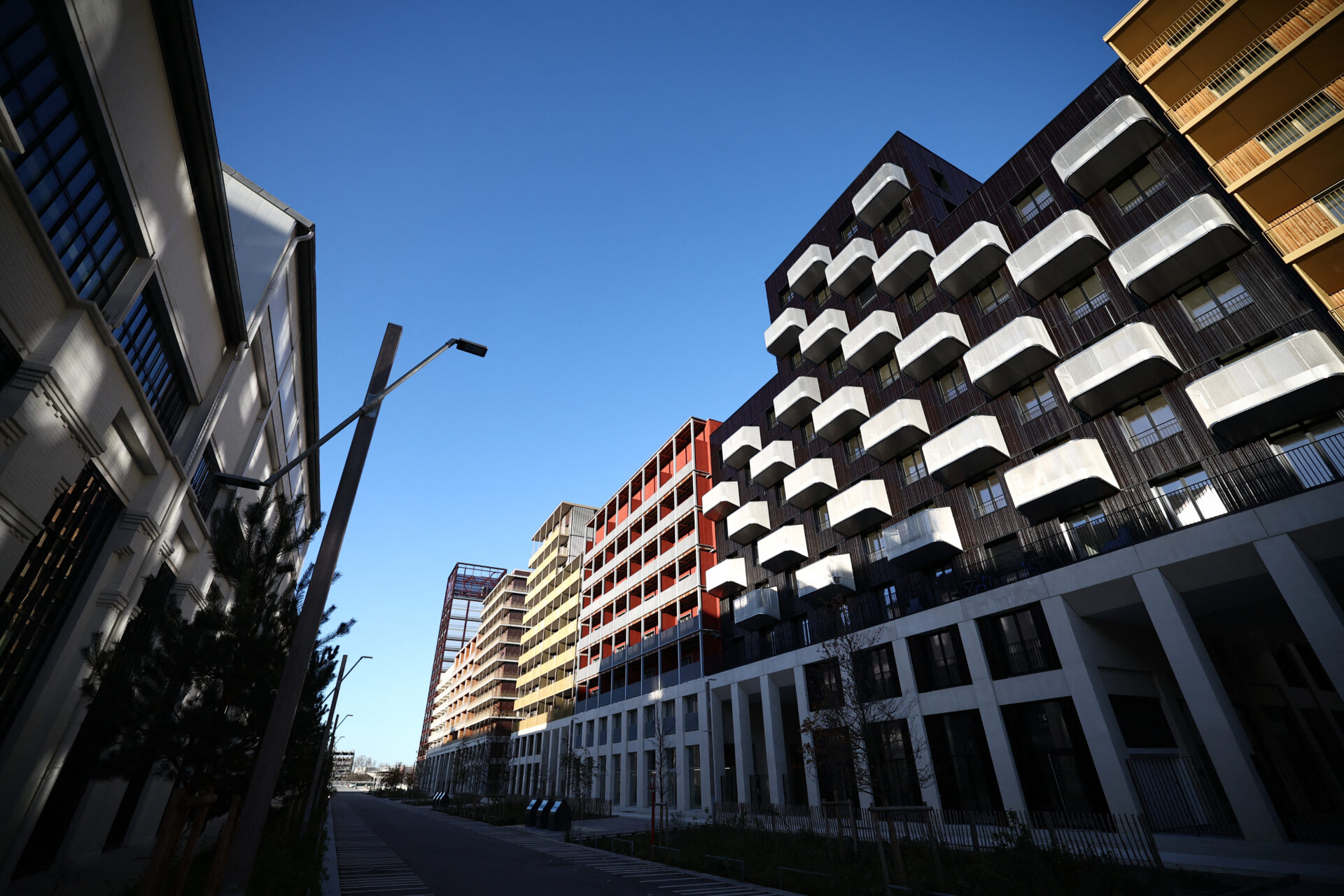 Apartments at the former athletes’ village of the Paris Olympics in Saint-Denis in November 2024. Photograph by Anne-Christine Poujoulat/Getty Images
Apartments at the former athletes’ village of the Paris Olympics in Saint-Denis in November 2024. Photograph by Anne-Christine Poujoulat/Getty Images
For Alauzy, it summed up the cruel paradox of the Olympics: “It was a kind of paradise surrounded by barbed wire. And around it, there were so many people who wanted to be part of it, who wanted to reach it, and who weren’t invited to the party.”
The city has denied accusations of social cleansing, pointing to the creation of more than 200 places in temporary shelters and justifying clearances as a security measure. It cites the Olympic swimming pool, now open to the public, as well as key infrastructure projects, including a new pedestrian bridge linking the Olympic village to the Stade de France, and the extension of Metro Line 14 to Saint-Denis, as tangible benefits.
The latter, planned long before the Games, has certainly been welcomed, but residents seem less convinced about promised improvements to housing. At a youth centre, in Carrefour Pleyel, a neighbourhood at the centre of development plans, a youth councillor named Dabi greeted a question about the housing legacy of the Olympics with a raised eyebrow. “Nothing has changed around here,” he said.
One teenage boy, eavesdropping on the conversation while playing Uno, offers his own opinion: “My mum has been waiting for social housing for years and years, but we’re still in the same place.”
The walk to the new apartments built for the Games takes just 20 minutes from the youth centre. Their sleek metal and wood façades, overlooking the Seine, stand in stark contrast to the ageing tower blocks and overgrown playgrounds passed along the way. But signs of life in the new neighbourhood are still scarce. The units released onto the private market have struggled to sell, with prices now averaging €6,900 per square metre, well beyond the means of most local residents.
Outside one of the older social housing blocks just metres from the development, Kamane is loading a television into a small van. He’s preparing to move his family out of the capital having outgrown the small flat offered to him by the city.
A construction worker by trade, Kamane said he waited a decade before securing the flat. It got so bad he contemplated a showdown. “I told my wife we should go to the city hall and stay there with the kids until we get an answer, even if they call the police,” he recalled.
It remains unclear just how many of the new apartments in the former Olympic village will ultimately be allocated to social housing tenants. An initial target of 40% has fallen to around 20%. Further complicating the picture is the tiered nature of social housing in France. It is the lowest category, reserved for people in serious economic hardship, that is likely to have the most meaningful impact on social housing pressures, yet few of the Olympic village units are expected to fall under this classification.
Stories like Kamane’s are not unusual. People on the list now wait an average of almost three years to secure a home, according to local officials. Many see the 320 social housing units in the former Olympic village as a drop in the ocean.
City officials have argued they lack the resources to address the scale of the housing crisis in Saint-Denis. Mayor Mathieu Hanotin has highlighted the disproportionate number of social housing requests the commune fulfils compared to wealthier neighbouring suburbs such as Neuilly-sur-Seine.
In response, the municipality appears to be embracing a strategy of attracting middle-class Parisians priced out of the city centre to the periphery, as a way to boost tax revenues and fuel local economic growth. Critics argue this approach risks accelerating gentrification while doing little to bring down social housing waiting lists.
With the media spotlight brought with the Olympics gone, keeping up pressure on the local authority is particularly important for groups like Right to Housing. The protest marked a minor victory, as officials agreed to meet with them.
“There were several people facing immediate eviction… We got responses regarding their situations that were fairly positive,” Huiban said of the meeting. At the same time, the prefecture sought to pass the buck to other authorities, including the regional social housing provider.
For now, though, Huiban will not be discouraged by the endless merry-go-round of French bureaucracy. “Well, fine, after summer, we’ll go see them too,” she declares.
